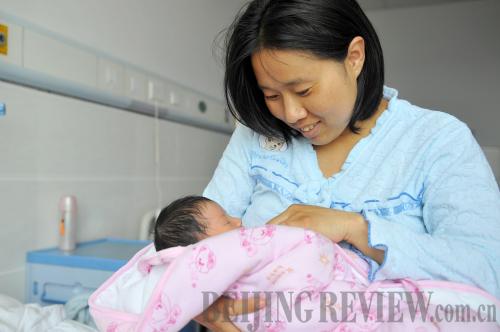|
 |
|
HI BABY: A woman holds her newborn at Fugu County Hospital in northwest China's Shaanxi Province on May 15, 2012 (LIU XIAO) |
Whenever Carol Richman went outside for a walk with her newborn Liliana Mei in Beijing, she was surprised that senior women would offer parenting tips.
"In America, I don't think anyone would approach a stranger and tell her that something she was doing with her child was wrong," said the 30-year-old lecturer at China Agricultural University.
The "wrong" thing Richman did, in local eyes, was taking almost daily walks so soon after delivery.
According to Chinese traditions, yuezi or confinement practices for the first month after childbirth is critical for motherhood adjustment and full recovery of the reproductive system. It is widely believed that a new mom who strictly follows this tradition will better rejuvenate.
Hence, there are some rules that can be traced back over 2,000 years. For instance, it is suggested that new moms stay at home, keep warm and avoid cooling foods as well as physical exercise to avoid aches and pains in old age.
"I think many such traditions are interesting, but a bit difficult for Westerners to understand," Richman told Beijing Review. "For example, most Americans I talked to thought that staying in bed or in the house for one month after the birth of a child was absolutely crazy."
Other things that Richman drove locals "crazy" with went far beyond a daily walk. Back on her feet the same day, she showered about an hour after her baby was born, and about three weeks later she climbed to the top of the Datong's Hanging Monastery in neighboring Shanxi Province.
"Americans don't have a lot of traditions that everyone follows after giving birth. But I appreciate Chinese honesty and how much people here care about my baby," she noted.
In similar circumstances, Tracy Lu, a math teacher at a Beijing-based international school, found that none of her Western colleagues followed any rules after childbirth.
Lu, 32, who used to work in Singapore after gaining a master degree in education, noticed that other Asian communities there, such as Malays and Indians, also have confinement rules. For Malays it is 44 days and 40 for Indians, both longer periods than the one-month yuezi in China.
Although dietary requirements and other practices among the above mentioned groups might vary, they share the common ideas of promoting blood circulation, strengthening joints and boosting milk supply for breastfeeding.
However, yuezi stereotypes such as no baths, hair washing, teeth brushing, cooling foods and drinks as well as outdoor activities, bothered Lu long before she met her Mr. Right.
"My knowledge of yuezi came from my mom, aunties and TV dramas. It sounded like a month-long house arrest," Lu stated. "I was totally scared."
The online communities
Lu is a member of China's post-80s generation, the first generation born after the nationwide family planning policy was introduced in the late 1970s. With a population of over 200 million, the group is also regarded as great beneficiaries of the country's opening-up policy and booming economy. Now the group is of childbearing age.
In the past decade, the number of newborns in China hit 15 to 17 million annually, even reaching 20 million in some years due to the auspicious implications of Chinese Zodiac animals such as dragon and pig, according to Lu Jiehua, sociology professor at Peking University.
When she found herself pregnant in 2011, Lu started researching and preparing. Besides reading books and consulting family members, she resorted to online communities like childcare forums and a social media networks for mother-and-baby information. Five months ahead of delivery, she drew up a yuezi shopping list. "It was summarized from the experiences and reviews posted online by new moms. I was happy to see that 90 percent of the stuff proved useful," she noted.
"Unlike their parents, most of the post-80s generation is the only child of their families. They grew up lonely and had no idea about raising a kid," said Wang Huainan, former Google's Asia CMO and co-founder of babytree.com, one of the biggest mother-and-baby websites in the country.
| 